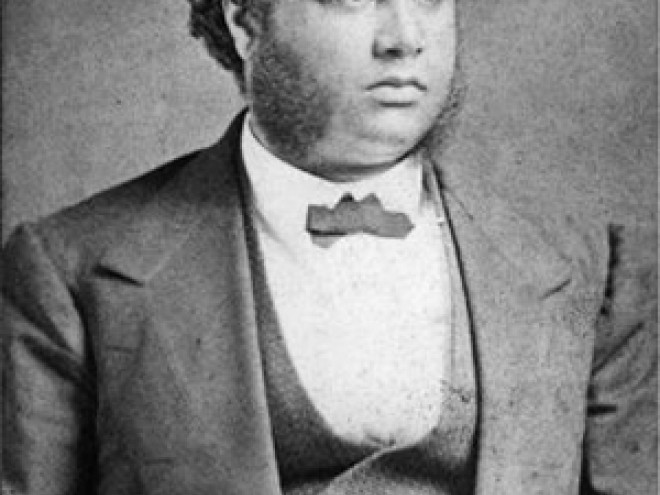Earlier this week, Sabra Waldfogel wrote about Raphael Moses, one of the most eminent Jews in Georgia in the nineteenth century. She has recently published Slave and Sister, a novel about Jews and slavery in antebellum Georgia, and will be blogging here all week for Jewish Book Council.
 Clara Solomon was a typical teenager. In the pages of her diary, she wrote about gossiping with her friends, tending to her younger sisters, yearning for pretty clothes, and fretting about her appearance. But her circumstances were far from typical. Clara Solomon kept her diary as the Civil War broke out and as the Union Army occupied New Orleans. She also wrote about the privations of the war; her worries for her father, working as a sutler for the Confederate Army; and her passionate defense of the Confederate cause.
Clara Solomon was a typical teenager. In the pages of her diary, she wrote about gossiping with her friends, tending to her younger sisters, yearning for pretty clothes, and fretting about her appearance. But her circumstances were far from typical. Clara Solomon kept her diary as the Civil War broke out and as the Union Army occupied New Orleans. She also wrote about the privations of the war; her worries for her father, working as a sutler for the Confederate Army; and her passionate defense of the Confederate cause.
In 1860, on the eve of the war, the Solomons were a well-to-do New Orleans family. The family was part of the long-established and assimilated Sephardic community spread throughout the United States. Clara’s father was a merchant, worth $1,000 in personal property, and he owned two slaves, 28-year-old Lucy and her 4‑year-old daughter Dell.
Dell was the pet of the family. Her duties as a servant were light. As Clara told it, Dell occasionally answered the door; on a hot summer afternoon, she fanned Papa Solomon as he lay on the floor, to the whole family’s amusement; and she kept Josie, the youngest Solomon daughter, company as they convalesced together from the measles. She romped with Josie and was punished with her when they were naughty. When Clara’s mother bought dresses for herself and for her daughters, she bought one for Dell, too.
Lucy’s position in the family was more complicated. Through Clara’s eyes, she was a pair of capable hands, making a delicious biscuit or skillfully arranging Clara’s hair. She was trustworthy enough to take money to the market to buy shrimps for dinner. But she could be insolent to Clara’s mother and obdurate about telling lies.
Lucy had a life of her own, one that Clara glimpsed and commented on. Lucy had a friend named Jacksine, a free black woman, who came to visit. Jacksine brought Lucy a gift from a man named Solomon, who was “crazy to see Lucy; he thinks the world of her.” Was he Dell’s father? Could he and Lucy marry, as Clara speculated they might?
For Clara, Lucy came into sharpest focus as all of them — Clara, her mother, and Lucy herself — contemplated the possibility that Lucy might run away to seek protection from the Union Army that occupied New Orleans. Clara put it selfishly, but she recognized that Lucy might yearn to be free: “There are many instances in which house-servants, those who have been raised by people, have deserted them, though they have received the kindest treatment at their hands; but they imagine no sacrifice too great with which to purchase freedom.”
Lucy was “faithful,” but she was also capable of betrayal. The thought angered Clara so much that she wrote, “Should one of mine [act so], I would inflict severe punishment, and should discard them for ever.”
Was Lucy a member of the family? Or a snake in its bosom, to be distrusted and feared? Or both?
In 1870, Clara was back home, having been widowed after a brief marriage. Lucy had not left, either. Now surnamed Lewis, she, her daughter Dell, and her son Robert, born in 1863, were still part of the Solomon household. For all of them, it seems, the familiar bonds were too hard to break.
Sources:
The Civil Diary of Clara Solomon, edited by Elliott Ashkenazi (Louisiana State University Press, 1995), and the Federal Censuses of 1850, 1860, and 1870.
Sabra Waldfogel grew up in Minneapolis and received her Ph.D. in American History from the University of Minnesota. Her short fiction has appeared in Sixfold Literary Magazine. Read more about her and her work at www.sabrawaldfogel.com.
Related Content:
- Reading List: Civil War
- Reading List: American Southern Experiences
- Sarah’s Key, Mary’s Secrets, and Truth That’s Stranger Than Fiction by Lois Leveen



